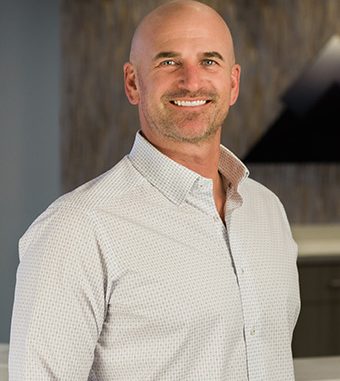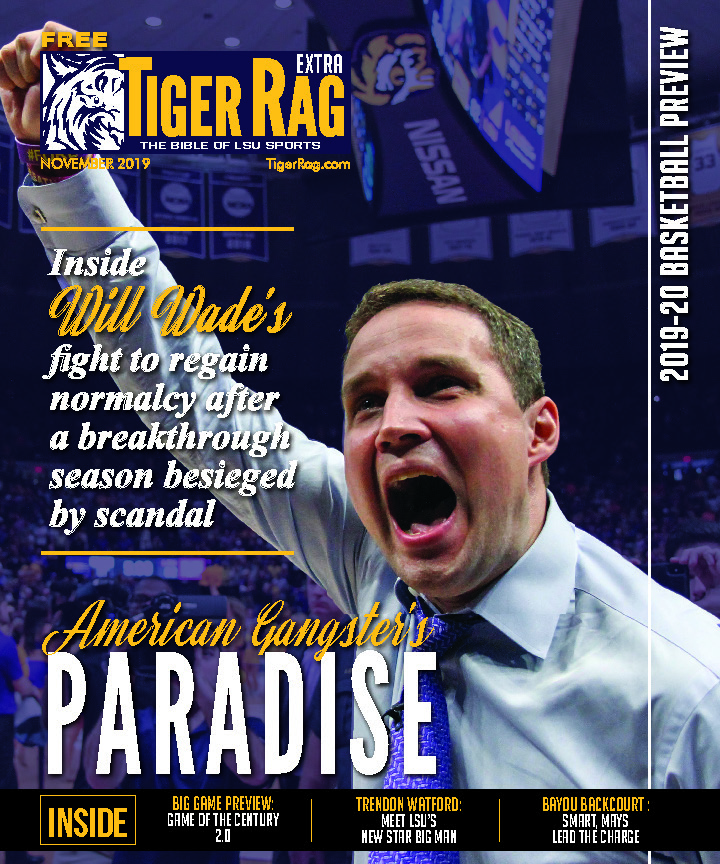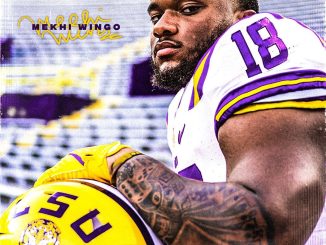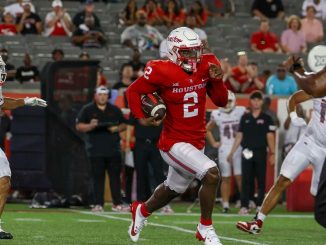
Twenty years after leading LSU to the 2003 national championship, quarterback Matt Mauck returned to Baton Rouge on Nov. 11 for a reunion of that team for the LSU-Florida weekend. Mauck found his way to LSU through his original relationship with football coach Nick Saban, who he committed to when he was the coach at Michigan State. Mauck signed a professional baseball contract out of high school instead of attending Michigan State and after a failed attempt at baseball, he found Saban for another attempt at college football at LSU and the rest is history. He shared his thoughts with Tiger Rag assistant editor William Weathers in a Nov. 6 interview which is also featured in the December edition of Tiger Rag Magazine.
TIGER RAG: Does it feel like it’s been 20 years since winning the national championship?
MATT MAUCK “I was talking to a few teammates, and I honestly can’t believe it. I know everybody says that and that time flies. Truly, it doesn’t feel like yesterday, but it like it was three or four years ago and 20 years is a long time.”
TR: How much have you been able to remain in communication with your teammates?
MM: “I would say we’re really close. I would say on a yearly basis, probably talk to 10-12 former teammates and that’s pretty good. When you come back for a game, you’re able to see people more often. That’s what made that team special is how everyone got along. No matter who you talked to on that team, there wasn’t one guy nobody liked and that wasn’t a team guy. I credit the coaching staff for not only putting together a team that had good players but were really good people.”
TR: How often are you able to come back to LSU and watch a game at Tiger Stadium?
MM: “Not nearly as much as I’d like to. If it was up to me, I’d come back every week. I love Baton Rouge and love the people down there and the friends that I have down there. I probably get back once a year on the average. There were a couple of years I was able to go twice. COVID threw that off and maybe missed a year or two. I try to get back at least once a year.”
TR: Has coach Brian Kelly made you as an alumnus feel part of the program?
MM: “From my experience, Coach Miles, Coach O and Coach Kelly have all been extremely welcoming to former players and try to make them feel like this is still your home, they still care about you and thank you for the things that you’ve done in the past. For a little while it felt like some of the same people were all still there when I was there. It’s a little bit different now but I’m still very good friends with Scott Woodward, Greg Stringfellow, Brent Bankston, Michael Bonnette. There are still people that are integral parts of the program that I stay connected with.”
TR: How prevalent is the fact that you’re a national championship-winning quarterback?
MM: “When you go through something like that, I don’t think you realize the impact it will have on your life. There’s only one of those every year, so you’re in pretty elite company when you do that. I’m not the most boastful guy in the world. A lot of times it doesn’t come up right away, but when people do find out my past, they have a lot of interest.”
TR: Where did you study dentistry?
MM: “At LSU. Brett Bankston, who was the team’s orthopedic surgeon and a dear friend, and at LSU I was going to do orthopedic surgery. He was the one that said I was kind of a little bit older; I should think about dentistry, and I went and shadowed a few dentists, and it sounded like a pretty good deal.”
TR: How did you put your studies on hold to pursue your dream of playing in the NFL?
MM: “I ended up having back surgery so that kind of helped make my decision for me. Sports has a shelf life to it. You try to do it as long as you can, and I was fortunate to get three years in the NFL and moved on to dental school.”
TR: Any lessons learned in sports you found impactful in your professional life?
MM: “Just hard work. A lot of times, sometimes when someone has been through a big-time athletic program, and it doesn’t have to be just football. It can be a women’s swimmer or cross country runner. Someone’s that willing to prioritize and do something at ab elite level understands the commitment that it takes. I have three boys and I tell them all the time that anybody can be ordinary. It takes someone special to do something extraordinary and I think sports provide that. You get to challenge yourself and find out that you could be extraordinary if you put the work in.”
TR: Are your three sons following in your athletic footsteps?
MM: They all play. My oldest (Tyson) is a senior at Cherry Creek High and is a very good receiver. I hope he gets to play some place in college. He definitely deserves it. We’ll see how that pans out for him. The good news is that he’s a very good student as well. I think he’ll be successful whether he gets to play sports or not in college.”
TR: Have you been able to take the time and throw to him growing up?
MM: “I still make sure he knows I’m still the best quarterback that ever threw to him.”
TR: Are your other two sons following on an athletic path as well?
MM: They’re into sports. My middle one plays quarterback as well and he’s a pretty good player. You just never know how puberty goes. There are just so many things that can happen.”
TR: When you signed with the Chicago Cubs, did you think that was going to be your career path?
MM: “I knew early on, not that I made a mistake, but that I just knew I missed football. Minor league baseball is not college football. Not anywhere close. I think I knew early on in the first 1 ½ to 2 years that I didn’t think I could do it and I needed to go back. I was very fortunate that Coach Saban had gone on from Michigan State to LSU and I couldn’t have selected a better scenario for me.”
TR: Were you having success on the minor league playing field?
MM: “I really think I would have eventually made it to the big leagues. I really do. I wasn’t patient enough in baseball. I always tell people that when they ask for advice. There’s all kind of gauges for success to feel a self-worth and pride in yourself and I tell them choose something you love to do.”
TR: How did coach Saban know you were looking to get back into football?
MM: “It was coincidental I was playing baseball in Lansing, Michigan. I just called and scheduled a meeting with him to talk. He was extremely gracious to know that whenever I was ready that I had a spot wherever he was at.”
TR: Your time at LSU was slow at the beginning until the 2001 SEC Championship Game?
MM: “It was definitely a welcome to big time college football pretty quickly. Not just because of my personal success, but my whole time at LSU and the teams I was on had a lot of success, but that (’01 SEC Championship Game) was probably my favorite game more than the national championship. It wasn’t just my coming out party but for LSU, our team. It started what’s been now a 20-year run where LSU’s probably being one of the top three or five best programs in the country.”
TR: Describe your first two years at LSU that included a season-ending injury on a team that was 5-1?
MM: “I think to this day offensive coordinator Jimbo Fisher would tell you that maybe it wasn’t his best play call he’s ever made in his life. We’re up 30 points at the time in the fourth quarter and he calls a QB draw. But the reality of it is I don’t think we win the national championship if that doesn’t happen because it (broken foot) forced me to become a better passer which allowed us to have more team success later on. As terrible as it felt when it happened it was probably the best thing that could have happened to me and part of the reason, we ended up winning the whole thing in 2003.”
TR: What was your rehabilitation like getting ready for the 2003 season?
MM: “I remember I was so determined to get back and to make myself a better player. One of the greatest things about LSU was we had a great support staff and how many wonderful people they had working there. They would always grab two equipment guys and I’d sit on the cooler, and they would get me two big bags of footballs and they would stand about 20 yards away and I would fire football after football. They would fill up the empty bag and bring it over and we’d do it again. It just helped me as a passer. I was still on crutches, and I would put them down and sit on the cooler.”
TR: Any defining moments along the way in 2003?
MM: “That team got so much better as the year went on. I think coach Saban and his staff did a tremendous job of not only adding good players, but good people. The two guys I credit a lot that really opened things up in the state of Louisiana were Marcus Spears and Michael Clayton who were top five players in the country. Before that LSU would land some of the bigger recruits but there were a lot of guys that kind of got out of the state and would go to other schools, and when they were able to sign those two guys it seemed like the whole state shut down and said, ‘If those two guys are going there, we’re going there’. I think it changed the momentum from a recruiting standpoint in the state.”
TR: Were there key games that got the team to the national championship against Oklahoma?
MM: “The game at Ole Miss … I preceded to give them a seven-point lead in the game. It was a true testament to what kind of team we were. I remember throwing the pick-6 on literally the first play of the game and every teammate, ‘hey don’t worry about it. We’ve got you’. Then we came back and won that game in an extremely hostile environment. That sticks out and how we stuck together and were truly a team that year.”
TR: How big was SEC Championship victory over Georgia?
MM: “The coaching staff had us ready to go in that game. Georgia had kind of popped off a little bit and that they should have beaten us at home that year. That was one of the greatest games I’ve played in. It was a really cool environment. We were determined, we wanted to prove that wasn’t a fluke. The 2001 SEC Championship Game was super memorable for getting us going in the right direction and that (regular season) Georgia game, I remember at the Tiger Walk is always cool and there’s a line of people when you get off the bus. It’s one of my favorite traditions they do. That game pulls up at the top of the (Victory) hill, you looked down and you couldn’t see concrete. There was that many people out there. I felt like LSU fans was dying to have a team to compete as a national power and that was kind of the start of it that year.”
TR: What was your experience like in the NFL with Denver and Tennessee?
MM: “Obviously it was a great experience. It was a little different. If you ask me what was more enjoyable, I’d probably say LSU and just the experience I had there. When I played you made a little more money and now you may actually make more money at LSU than professionally. The one thing the NFL teaches you in life is that you have to believe in yourself. People ask me what I do now and I them I’m a butcher. I tell them imagine having the 20 best butchers in America watching you every single day and when you don’t have a good day, you’re worried that you may get fired. I tell them that’s pretty much what playing professional sports is like and that’s not for everybody. People don’t handle that pressure very well.”
TR: How did your experience with Denver lead to you setting down roots there and building your dentistry practice there?
MM: “I miss Louisiana. Obviously, I’m not from there originally and from Indiana, but I consider Louisiana one of my homes. I miss it tremendously. It was a unique opportunity that I had here and I’m kind of an outdoorsy person that likes to stay in shape and it’s a pretty good environment for that. I love my life here, but there are times when I wonder what it would be like if I was back in Baton Rouge.”




Be the first to comment